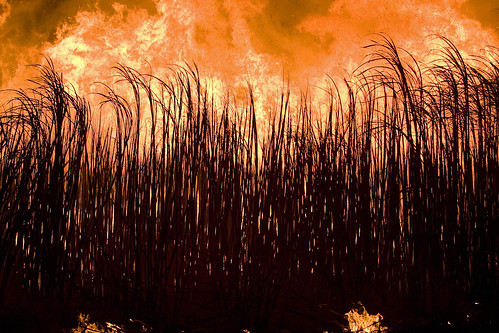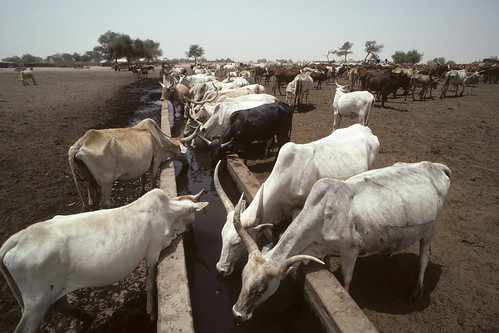Rep. Scott Peters, D-CA has introduced smart new legislation which can help to mitigate the worst effects of climate change. His new bill entitled "Super Pollutant Emissions Reduction Act of 2013", is aimed at combating some of the most significant drivers of global climate change; the short lived climate pollutants (SLCP's). The SLCP's are greenhouse gases that produce much more warming, molecule-for-molecule, than carbon dioxide. However, unlike CO2, they have a short atmospheric lifecycle. When emitted, they hang out in atmosphere for anywhere from a few days to a few years and then drop back to earth. They include: black carbon, tropospheric ozone, methane, and hydrofluorocarbons (HFCs). Reducing them now is the only chance we have of avoiding rapidly rising seas and of slowing the loss of biodiversity.
Reducing SLCPs can buy us some time, forestalling some near-term climate impacts while we get our act together to reduce CO2 in the long-term. A paper in Nature Climate Change finds that “mitigation of the four short-lived climate pollutants … has been shown to reduce the warming trend by about 50% by 2050.”
Rep. Peters new legislation is called 'The Super Act' because it would reduce super pollutants. Super pollutants are far more potent than CO2, with between 25 and 4000 times more global warming potential over a 100-year period. Furthermore, these pollutants remain in the atmosphere for no more than 15 years. Some gases such as black carbon and tropospheric ozone last less than two weeks. CO2 has a much longer atmospheric lifetime. Quick action to reduce super pollutant emissions can have major short-term benefits, not only drastically reducing sea level rise but also in major slowing of biodiversity loss.
The US is a global leader in reducing the SLCP's. In 2012, the United States founded the Clean Air and Climate Coalition to Reduce Short-Lived Climate Pollutants (CCAC), an organization that fosters international cooperation on reducing super pollutant emissions and now has grown from an original six to 30 state partners.
The CCAC recommends the following initiatives for reducing the SLCP'S:
Reducing Black Carbon Emissions from Heavy Duty Diesel Vehicles and Engines
Mitigating Black Carbon and Other Pollutants From Brick Production
Mitigating SLCPs from the Municipal Solid Waste Sector
Promoting HFC Alternative Technology and Standards
Accelerating Methane and Black Carbon Reductions from Oil and Natural Gas
Drew Shindell of NASA's Goddard Institute for Space Studies recommends the banning of agricultural fires used to prepare deforested land for livestock grazing and to prepare land for livestock crops to reduce Black Carbon and Methane

"Ban Agricultural Burning by NASA Goddard Space Flight Center, on Flickr"
Shindell also recommends Minimizing Methane from Livestock

"Minimize Methane from Livestock by NASA Goddard Space Flight Center, on Flickr"
The stakes couldn't be higher. With current historical highs for greenhouse gas emissions at 400 ppm we need a short term solution to buy us the time to reduce the longer living CO2. SLCP mitigation measures are not as politically charged as CO2 measures tend to be. Cutting emission of SLCPs is a route into immediate climate mitigation that does not require huge political battles over divisive issues. And as the greatest contributor to the SLCP's is livestock agriculture; there's a way that we all can participate for immediate reduction in the SLCP's by reducing/eliminating consumption of meat and animal products. There is no time to lose.
|
Help Us Spread the Word About Climate Change

For those of you on Facebook and Twitter: Please help to spread the word by hitting the FB and Tweet links at the top of this diary and if you have time, join the discussion with comments. Share such postings with friends, family, co-workers, and acquaintances.
Thanks, as all of this helps build the Climate Change movement as well as introducing critically important ideas about renewable sources of energy.
Please use hashtags #climate, #eco, and #climatechange to tweet all diaries about the environment.

"Green Diary Rescue" is Back!
After a hiatus of over 1 1/2 years, Meteor Blades has revived his excellent series. As MB explained, this weekly diary is a "round-up with excerpts and links... of the hard work so many Kossacks put into bringing matters of environmental concern to the community... I'll be starting out with some commentary of my own on an issue related to the environment, a word I take in its broadest meaning."
"Green Diary Rescue" will be posted every Saturday at 1:00 pm Pacific Time on the Daily Kos front page. Be sure to recommend and comment in the diary.
|


